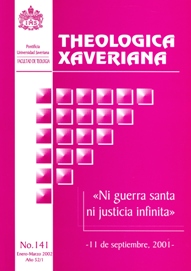Abstract
Desde una perspectiva cristiana, el autor analiza las implicaciones del acto terrorista, identificando lo negativo de la globalización como el común denominador que ahonda el abismo entre el Norte y el Sur, y entre los fundamentalistas islámicos y el Occidente cristiano. Concluye que la solución al terrorismo no se logra por la vía de las armas, sino reforzando la solidaridad y la convivencia intercultural y religiosa, con la inspiración del Evangelio y el liderazgo testimonial del Papa por la justicia y el ecumenismo.This journal is registered under a Creative Commons Attribution 4.0 International Public License. Thus, this work may be reproduced, distributed, and publicly shared in digital format, as long as the names of the authors and Pontificia Universidad Javeriana are acknowledged. Others are allowed to quote, adapt, transform, auto-archive, republish, and create based on this material, for any purpose (even commercial ones), provided the authorship is duly acknowledged, a link to the original work is provided, and it is specified if changes have been made. Pontificia Universidad Javeriana does not hold the rights of published works and the authors are solely responsible for the contents of their works; they keep the moral, intellectual, privacy, and publicity rights.
Approving the intervention of the work (review, copy-editing, translation, layout) and the following outreach, are granted through an use license and not through an assignment of rights. This means the journal and Pontificia Universidad Javeriana cannot be held responsible for any ethical malpractice by the authors. As a consequence of the protection granted by the use license, the journal is not required to publish recantations or modify information already published, unless the errata stems from the editorial management process. Publishing contents in this journal does not generate royalties for contributors.


